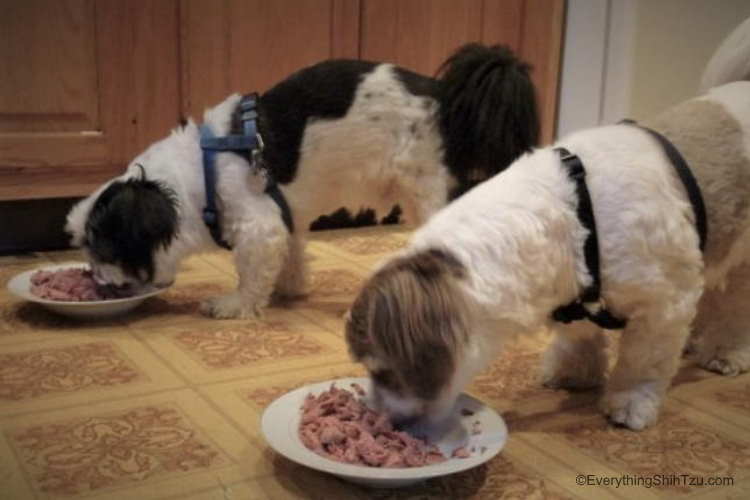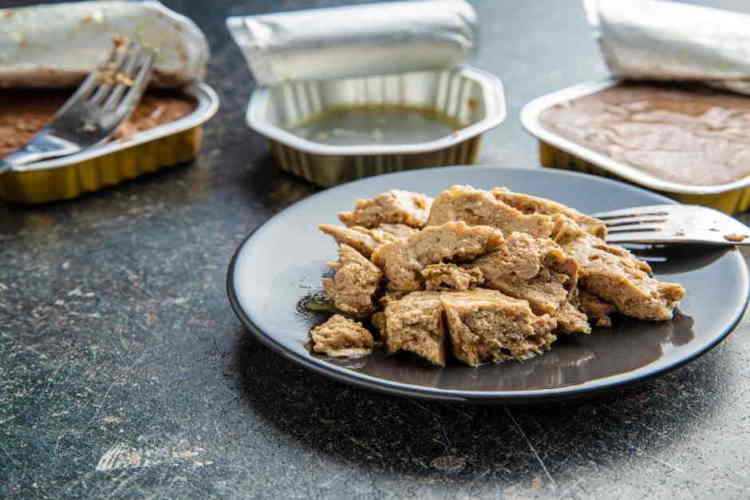- Home
- Shih Tzu diet
- senior nutrition
Growing Old Gracefully: Understanding the Nutritional Needs of Senior Dogs
By Everything Shih Tzu October 20, 2022
This post may contain affiliate links. Read privacy & disclosure policy for info
It seems like an easy question, right? You buy your dog some kibble and they’re good to go. But what happens as they grow older? How do their nutritional needs change as they age?
The first time we took that question seriously was when we realized our Shih Tzu were approaching middle age.
It didn’t take long for us to realize that as dogs get older, their nutritional needs are different than younger dogs.

As dogs reach their senior years, their metabolism begins to slow down, and they will need fewer calories. In addition to a slowing metabolism, senior dogs may experience a decline in their sense of smell and taste.
This means you have to adjust their food intake to ensure they get all the nutrients they need.
And because their sense of taste and smell diminishes, they are less likely to detect new flavors in their food. So you may have to mix up their meals and give them a variety of flavors to keep them interested.
A senior dog's nutritional needs also change over time due to a decrease in activity levels, which is why feeding them the ideal diet from an early age is so important for their long-term health.
Read on to learn more about these dietary changes and how you can easily implement them in your dog's daily life.
The Scoop on How Much Senior Dogs Need to Eat
One of the most critical factors when it comes to your senior dog’s diet is how much your dog should be eating on a daily basis.
This is because older dogs tend not to be as active as they once were, plus their metabolisms can slow down a bit.
For this reason, you might assume your aging dog might not need as much food as they ate when they were younger.
However, this doesn’t always mean you should cut back on what your dog is eating; it might just require a switch to different food.
But, just because you choose a senior dog food for your pup doesn’t mean it’s automatically the correct choice calorie-wise.
In fact, many old dogs are underweight due to various reasons, including loss of appetite and specific health issues.
In these cases, your pup might actually need more calories than they did when they were younger.
Therefore, you need to consider your dog’s actual daily calorie needs, know what a healthy weight for your pup is, and feed your dog an amount of food that makes sense for them.
Many dog foods will include a chart on the label to help guide you with how much to feed them.
It’s a good idea to break up this amount into at least two smaller meals a day.
Your pup can probably only handle so much food at one time, and you don’t want them to end up throwing up half their meal.
Be sure that you always check the label for the specific food you are feeding your dog, as all dog foods are not interchangeable.
For example, if your dog weighs ten pounds, then roughly ¾ of a 13oz can of dog food could be the recommended daily amount.
However, a different brand of dog food might suggest an entire can.
This is because different foods consist of different ingredients and ratios that give them a unique calorie count per serving.
The best way to ensure you are feeding your senior dog an adequate amount of food each day is to consult your vet about which food and how much to give your pup.
What's on the Menu for the Golden Years? Key Nutrients for Senior Dogs
While a dog’s nutritional needs vary depending on the dog, protein is integral to your senior dog’s diet.
As dogs age, they tend to lose muscle mass, making it harder for them to move around and be active.
Protein helps fuel healthy muscles.
Therefore, as a result, senior dogs often need more protein than when they were younger.
The typical recommendation is that 25% of a senior dog’s daily calories come from protein.
Some sodium is still beneficial, but it’s worth decreasing the amount of sodium in your dog’s diet as they age. This is especially true if your dog suffers from any heart or kidney problems.
In addition, several prescription dog foods are available that could be worth considering if your dog has some medical issues.
Your vet can talk through these various options with you, and if it’s mutually agreed that your dog would benefit from food like this, your vet can give you a prescription.
Then, you can choose to use the prescription to order the food online or purchase it directly from your vet (head up - more expensive).
Does a Senior Dog Need Supplements?
The answer to this one is certainly not black and white.
Many senior dog foods will add in various supplements, touting how beneficial and necessary they are for aging pups.
However, many don’t seem to make a difference, although they make the food more expensive.
However, there are some supplements, like Omega-3 fatty acids, that can greatly improve the condition of your dog’s skin, coat and help with bone and joint support and brain function.
The most important thing to remember when giving your dog supplements is that it’s best to clear your choice with your vet first.
Your vet can help guide you in the right direction and keep you from giving your dog anything unnecessary.
What If My Senior Dog Doesn’t Want to Eat?
An older dog could have a decreased appetite for a number of reasons, including decreased appetite, loss of taste or sense of smell, weak or sore teeth, and gums, or underlying health issues.
If your pup appears like they want to eat but aren’t, you could try switching up the food to one that is a bit more palatable.
If sore teeth are to blame, softening the food or trying wet food could offer a potential solution.
If you switch foods, do so gradually. Mix the new food with the old over several days, gradually increase the amount of the new food, and decrease the amount of the former food.
This process helps guard against things like stomach upset and discomfort. If, once you make this switch, your pup starts chowing down, then you’ve likely pinpointed the problem.
However, if your dog still refuses to eat or shows little to no interest in their food, you should consult with your vet.
There could be more significant, more serious issues at play that need to be addressed immediately.
Consequently, it’s advisable to bring your senior dog for vet well visits twice a year (every six months), as issues can pop up more often in older dogs.
The sooner your vet diagnoses a problem, the more treatable it is.
Summary
As your dog ages, their metabolism slows down and their body begins to change in ways that can make them feel and act older than they really are.
Even if they appear outwardly calm, older dogs often experience changes in their behavior and mood as well.
Their senses may become more acute, making them more aware of noises or sudden movements.
They may also begin to lose their appetite or have more trouble swallowing solid foods.
These changes can be difficult for any pet parent to deal with, but they don’t necessarily mean that your dog is growing old overnight.
Instead, it’s a natural result of aging and a sign that it’s time for your dog to start eating fewer calories so that they no longer need such a high amount of nutrients per day.
When it comes to caring for an older dog, many things change from how you cared for them as a puppy and a young adult.
For example, older dogs tend to experience different exercise needs, want to sleep more, are more susceptible to health issues, and typically develop appetite changes.
It’s essential to ensure your senior dog gets the proper nutrients to continue to live a healthy life.
Typically, this includes a low-sodium diet, adequate protein intake, and perhaps some supplements.
However, every dog is different, and there is no one set program of what an older dog is supposed to eat.
Just like humans, dogs’ needs adapt and shift as they age.
Dietary requirements are one of the most significant changes, and it’s essential to know the basics so your dog gets what they need.
- Home
- Shih Tzu diet
- senior nutrition



